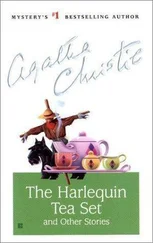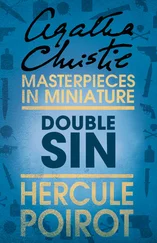“Julian?” she said. “Did you come here to find Julian?” But there was no answer. The man lay with eyes closed, his breathing coming in slow, shallow fashion.
Bunch turned and left the church rapidly. She glanced at her watch and nodded with some satisfaction. Dr. Griffiths would still be in his surgery. It was only a couple of minutes’ walk from the church. She went in, without waiting to knock or ring, passing through the waiting room and into the doctor’s surgery.
“You must come at once,” said Bunch. “There’s a man dying in the church.”
Some minutes later Dr. Griffiths rose from his knees after a brief examination.
“Can we move him from here into the vicarage? I can attend to him better there—not that it’s any use.”
“Of course,” said Bunch. “I’ll go along and get things ready. I’ll get Harper and Jones, shall I? To help you carry him.”
“Thanks. I can telephone from the vicarage for an ambulance, but I’m afraid—by the time it comes. . . .” He left the remark unfinished.
Bunch said, “Internal bleeding?”
Dr. Griffiths nodded. He said, “How on earth did he come here?”
“I think he must have been here all night,” said Bunch, considering. “Harper unlocks the church in the morning as he goes to work, but he doesn’t usually come in.”
It was about five minutes later when Dr. Griffiths put down the telephone receiver and came back into the morning room where the injured man was lying on quickly arranged blankets on the sofa. Bunch was moving a basin of water and clearing up after the doctor’s examination.
“Well, that’s that,” said Griffiths. “I’ve sent for an ambulance and I’ve notified the police.” He stood, frowning, looking down on the patient who lay with closed eyes. His left hand was plucking in a nervous, spasmodic way at his side.
“He was shot,” said Griffiths. “Shot at fairly close quarters. He rolled his handkerchief up into a ball and plugged the wound with it so as to stop the bleeding.”
“Could he have gone far after that happened?” Bunch asked.
“Oh, yes, it’s quite possible. A mortally wounded man has been known to pick himself up and walk along a street as though nothing had happened, and then suddenly collapse five or ten minutes later. So he needn’t have been shot in the church. Oh no. He may have been shot some distance away. Of course, he may have shot himself and then dropped the revolver and staggered blindly towards the church. I don’t quite know why he made for the church and not for the vicarage.”
“Oh, I know that, ” said Bunch. “He said it: ‘Sanctuary.’ ”
The doctor stared at her. “Sanctuary?”
“Here’s Julian,” said Bunch, turning her head as she heard her husband’s steps in the hall. “Julian! Come here.”
The Reverend Julian Harmon entered the room. His vague, scholarly manner always made him appear much older than he really was. “Dear me!” said Julian Harmon, staring in a mild, puzzled manner at the surgical appliances and the prone figure on the sofa.
Bunch explained with her usual economy of words. “He was in the church, dying. He’d been shot. Do you know him, Julian? I thought he said your name.”
The vicar came up to the sofa and looked down at the dying man. “Poor fellow,” he said, and shook his head. “No, I don’t know him. I’m almost sure I’ve never seen him before.”
At that moment the dying man’s eyes opened once more. They went from the doctor to Julian Harmon and from him to his wife. The eyes stayed there, staring into Bunch’s face. Griffiths stepped forward.
“If you could tell us,” he said urgently.
But with eyes fixed on Bunch, the man said in a weak voice, “Please— please —” And then, with a slight tremor, he died. . . .
Sergeant Hayes licked his pencil and turned the page of his notebook.
“So that’s all you can tell me, Mrs. Harmon?”
“That’s all,” said Bunch. “These are the things out of his coat pockets.”
On a table at Sergeant Hayes’s elbow was a wallet, a rather battered old watch with the initials. W.S. and the return half of a ticket to London. Nothing more.
“You’ve found out who he is?” asked Bunch.
“A Mr. and Mrs. Eccles phoned up the station. He’s her brother, it seems. Name of Sandbourne. Been in a low state of health and nerves for some time. He’s been getting worse lately. The day before yesterday he walked out and didn’t come back. He took a revolver with him.”
“And he came out here and shot himself with it?” said Bunch. “Why?”
“Well, you see, he’d been depressed. . . .”
Bunch interrupted him. “I don’t mean that. I mean, why here?”
Since Sergeant Hayes obviously did not know the answer to that one, he replied in an oblique fashion, “Come out here, he did, on the five ten bus.”
“Yes,” said Bunch again. “But why? ”
“I don’t know, Mrs. Harmon,” said Sergeant Hayes. “There’s no accounting. If the balance of the mind is disturbed—”
Bunch finished for him. “They may do it anywhere. But it still seems to me unnecessary to take a bus out to a small country place like this. He didn’t know anyone here, did he?”
“Not so far as can be ascertained,” said Sergeant Hayes. He coughed in an apologetic manner and said, as he rose to his feet, “It may be as Mr. and Mrs. Eccles will come out and see you, ma’am—if you don’t mind, that is.”
“Of course I don’t mind,” said Bunch. “It’s very natural. I only wish I had something to tell them.”
“I’ll be getting along,” said Sergeant Hayes.
“I’m only so thankful,” said Bunch, going with him to the front door, “that it wasn’t murder.”
A car had driven up at the vicarage gate. Sergeant Hayes, glancing at it, remarked: “Looks as though that’s Mr. and Mrs. Eccles come here now, ma’am, to talk with you.”
Bunch braced herself to endure what, she felt, might be rather a difficult ordeal. “However,” she thought, “I can always call Julian to help me. A clergyman’s a great help when people are bereaved.”
Exactly what she had expected Mr. and Mrs. Eccles to be like, Bunch could not have said, but she was conscious, as she greeted them, of a feeling of surprise. Mr. Eccles was a stout florid man whose natural manner would have been cheerful and facetious. Mrs. Eccles had a vaguely flashy look about her. She had a small, mean, pursed-up mouth. Her voice was thin and reedy.
“It’s been a terrible shock, Mrs. Harmon, as you can imagine,” she said.
“Oh, I know,” said Bunch. “It must have been. Do sit down. Can I offer you—well, perhaps it’s a little early for tea—”
Mr. Eccles waved a pudgy hand. “No, no, nothing for us,” he said. “It’s very kind of you, I’m sure. Just wanted to . . . well . . . what poor William said and all that, you know?”
“He’s been abroad a long time,” said Mrs. Eccles, “and I think he must have had some very nasty experiences. Very quiet and depressed he’s been, ever since he came home. Said the world wasn’t fit to live in and there was nothing to look forward to. Poor Bill, he was always moody.”
Bunch stared at them both for a moment or two without speaking.
“Pinched my husband’s revolver, he did,” went on Mrs. Eccles. “Without our knowing. Then it seems he come here by bus. I suppose that was nice feeling on his part. He wouldn’t have liked to do it in our house.”
“Poor fellow, poor fellow,” said Mr. Eccles, with a sigh. “It doesn’t do to judge.”
There was another short pause, and Mr. Eccles said, “Did he leave a message? Any last words, nothing like that?”
Читать дальше











